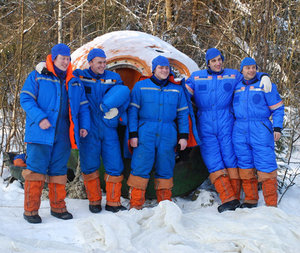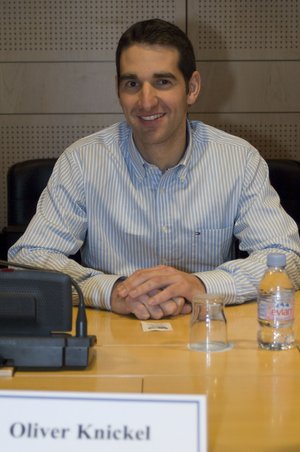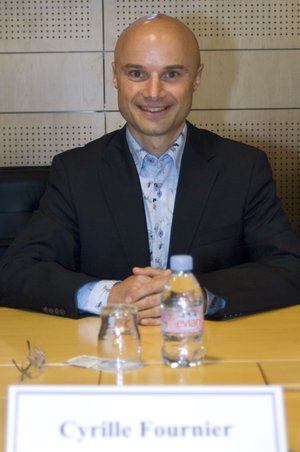Mars500 diary: a typical day
The Mars500 crew are about to embark on the final three weeks of their 105-day simulated mission to Mars. ESA-selected crewmember Cyrille Fournier writes about the passing of time inside the isolation facility at the Institute of Biomedical Problems in Moscow, Russia.
Cyrille Fournier writes
During the past week we have crossed another important line. Indeed, from now on, we are no longer counting down the time remaining in weeks but rather in days: as I am writing this dairy, we are 23 days away from our exit from the module.
Let’s take a moment here to mention our impressions about how time is passing by, although if you are regularly reading our reports, you may already have a slight idea. As Oliver wrote a couple weeks ago, time is flying. This is not just a common sentence thrown on our computer screen to fill our reports.
Of course, in daily life, we all have the feeling that time is passing by quickly, that it has already been a year that has passed since last summer, etc… But when we cannot see the sky, when we cannot perceive the sunlight (or the night), when our only way to be aware of the time that goes by is by our sleep patterns (which are quite altered due to external factors) or the frequency we are on shifts, it gives another perception of the hour, this essential time unit. Yes, we all have the feeling that we entered the module only two or three weeks ago and that the actual three weeks ahead of us will pass by even faster than we expect.
We finally realised that 15 weeks are not that long. Concerning the next step, which is the 520-day isolation (or almost 75 weeks, more than 17 months), I am sure that the crew who will be locked in the module will have the exact same feeling as we are having now.

The main problem may be more psychological. You need to realise that the isolation you are in is more valuable (in all senses) than the life you could have had outside, with your family and friends, with all the possible good moments or potential important achievements you could have accomplished. This is precisely why psychological support is really important and is probably the main key to success. We will see, but we are all ready here to prepare this long isolation as best as we can, with all the knowledge and ideas we have after our 12 weeks in this module…
On another level, concerning our activities, I have to say that this week has been rather quiet. Yes of course, we still had to perform experiments and although most of them took a lot of our time, they were quite easy to carry out.
Let me then try to sum up our typical day, or at least the common steps all of us are performing every day. It obviously starts with the wake-up, performed by the crewmember just finishing his 24-hour shift, at 8 o’clock. Sometimes, we can enjoy a later wake-up at 08:30 but it is seldom and sometimes also we get up at 07:30, depending on what experiment we need to perform.
Once we switch on the lights, we stay in bed for what we call the ‘Medcontrol’, which is a light and benign medical check: we record our temperature, we take three measurements of both our blood pressure and heart rate and finally our weight. These data are then sent rapidly to the duty doctor in the Mission Control room.

Then, we are evidently on our feet and we can walk peacefully to one of the three toilets. However, we are not going to the toilet alone as we bring along the container in which we are gathering our urine over a 24-hour period. And precisely, our first morning visit to the toilet concludes this 24-hour urine collection.
Once we are relieved, we record the total volume, take four (sometimes more, up to seven) samples of this precious liquid and wash our container to make it ready for the next 24 hours. Then the day can start with our breakfast… I would like to stress however on the point that what takes about two minutes at home in our everyday life requires us about 25 minutes!
Except if there’s a scheduled experiment that requires to be carried out on an empty stomach, we can then have breakfast (and we eat only but completely what is mentioned in our meal plans), usually composed of a small pack of cereals with 20 cl of milk, 3 small bread rolls, butter and jam with coffee or tea.
After that, we all scatter to different places in the module to implement our experiments as we do not perform the same experiments at the same time. While the crewmember who has just woken up the crew is going to sleep, one may start with physical training while another one will perform tests on a computer or a third one will check our greenhouse or our bacteria cultures.

Usually we have to perform twice a day (in the morning and in the late afternoon) a battery of computer tests proposed by several American universities and backed by a NASA-affiliated organisation. I say ‘usually’ because the one on shift has to perform those tests 7 times across 24 hours (twice during the day, once at 22:30 and 4 times from 01:00, every 2 hours).
The afternoon is usually as the morning, everybody being occupied by the tasks scheduled on his personal planning. But we all gather for lunch and dinner, prepared by the duty crewmember, as these are special moments, during which we can obviously discuss the problems we have encountered or ask the questions we have but also have conversations on various subjects, altogether.
Then the evening is rather for leisure, except when there are once again experiments scheduled or when we have to prepare someone for sleeping with different apparatus, such as the EEG recording caps. And before going to bed, we perform once again a Medcontrol check, exactly the same as the one in the morning.
Finally, our leisure time is rather personal of course but we are reading a lot, we may also write messages to our families, or gather in the crew room or in the kitchen for some games, just like we did a few evenings this week, for playing yam, a dice game in which you have to get specific combinations with the five dice. By the way, Oliver, probably because of his agile ability to throw those dice better than the others, managed very well and got high scores!
A last word for a more than happy moment… Our ESA Project Manager has given birth to her first child last Sunday evening and all of us here would like to congratulate the parents, Jennifer and Jürgen, but also to welcome Paul Vincent to our fascinating world! I could even say ‘worlds’ as he may even be a (participating?) witness of mankind’s expansion to the Moon and possibly even Mars!









